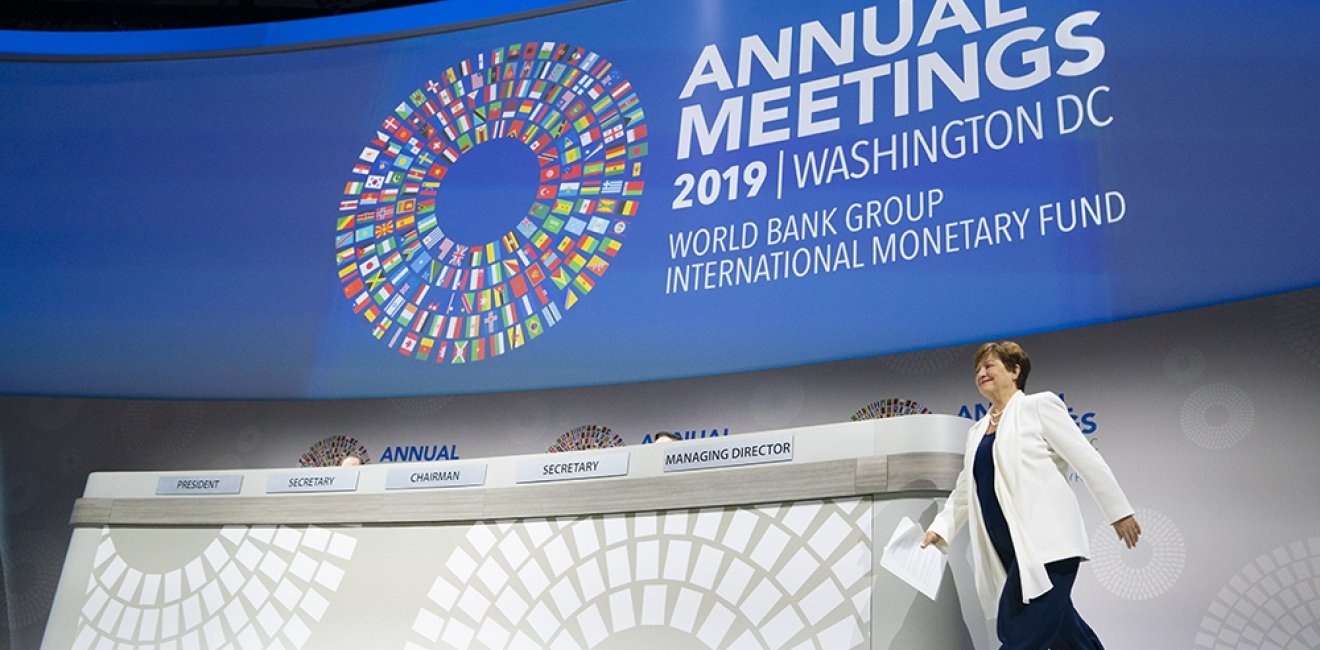
A blog of the Indo-Pacific Program
From ongoing trade wars to monetary policy hitting a wall, the outlook for the global economy is hardly rosy. But following its annual meeting in Washington, the International Monetary Fund was quick to point out the rocky road ahead limited what could actually be done to prevent the slowdown from escalating further. The convening power of the IMF, bringing together central bankers and finance ministers from across the world, remains indisputable. Yet how the IMF and other international financial institutions may be able to preempt the risks ahead remain unclear at best.
Political as much as macroeconomic risks clearly loom large in Asia. In its flagship World Economic Outlook report, the IMF was quick to point out that escalating trade tensions between the United States and China were one of the biggest factors weighing down on global growth. Its chief economist Gita Gopinath stated that “the weakness in growth is driven by a sharp deterioration in manufacturing activity and global trade, with higher tariffs and prolonged trade policy uncertainty damaging investment and demand for capital goods.” The agency now projects global GDP growth to reach 3.0 percent in 2019, the slowest pace of growth since the global financial crisis of 2008.
Asian countries, especially Japan and South Korea, have been particularly vulnerable to the uncertainties.
It’s hardly surprising that the ongoing trade dispute between Washington and Beijing would hurt growth prospects worldwide, given the impact the tariff increases have on markets including raising costs, disrupting supply chains, lowering productivity, and keeping new investments at bay as businesses not just in China and the United States but worldwide scramble to anticipate the next moves by the governments. Asian countries, especially Japan and South Korea, have been particularly vulnerable to the uncertainties, even though Southeast Asia has benefitted to an extent from the relocation of investments from China to other parts of the region that are more competitive as well as stable. What’s more, the fact that the United States is now entering a new phase in trade tensions with the European Union, is only increasing the downward pressure posed by escalating tariff wars.
What is also clear is that algorithms, which have been at the heart of assessing political risk, are not as effective in measuring the risks that are entailed. Certainly, when it comes to anticipating and preparing for, as well as hedging against the uncertainties surrounding trade policy, an appreciation of political motivation is as significant as quantitative analysis. In the case of anticipating the consequences of the U.S.-China trade dispute, for instance, the political variables of how and whether the first phase of the bilateral trade deal will be implemented, and whether already imposed tariffs will actually be lifted, continues to loom large.
The time is ripe for the IMF to put its ability as a convener into good use
Having cited the ongoing trade tensions on multiple fronts as one of the biggest disruptors of global growth, the question then is how the IMF may be able to play a role in mitigating some of the ensuing risks. Whilst ensuring financial stability and providing capital to help the balance of payments is its primary objective, the agency also has the ability as well as a mandate to coordinate policies. Of course, policy coordination has focused on that by finance ministries and central banks, yet given the risks imposed by highly politically charged trade relations, the time is ripe for the IMF to put its ability as a convener into good use, and promote a trade risks conference that brings together not just trade negotiators, but also economists from the countries both directly and indirectly impacted to the table in order to assess the longer-term risks of each tariff decision that is being contemplated.
With Bulgarian economist Kristalina Georgieva newly appointed as its managing director, it is an opportune time to consider new ways of engagement. With unemployment not as significant an issue in most industrialized countries and record-low interest rates across the board, the levers of driving the global economy itself is clearly changing. With political risk becoming a bigger factor in upsetting growth worldwide, it is time to expand the role of international financial agencies can play in ensuring multilateral cooperation.
Image: Flickr/International Monetary Fund (CC BY-NC-ND 2.0)
Follow Shihoko Goto, deputy director for geoeconomics and senior associate for Northeast Asia, on Twitter @GotoEastAsia.
The views expressed are the author's alone, and do not represent the views of the U.S. Government or the Wilson Center. Copyright 2019, Asia Program. All rights reserved.
Author


Indo-Pacific Program
The Indo-Pacific Program promotes policy debate and intellectual discussions on US interests in the Asia-Pacific as well as political, economic, security, and social issues relating to the world’s most populous and economically dynamic region. Read more





